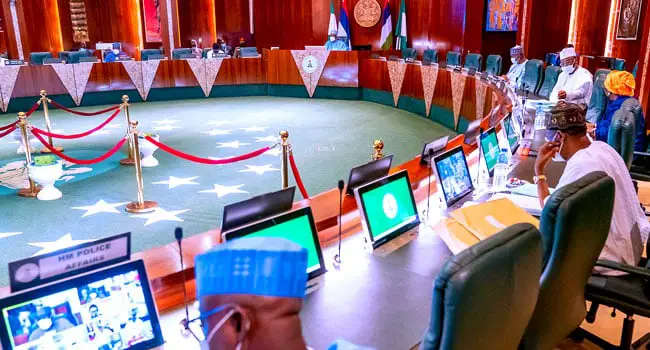The Federal Executive Council (FEC) has taken a significant step towards improving Nigeria’s economic stability by approving the Economic Stabilization Bills (ESB). This decision, made during the 18th meeting of the council presided over by President Bola Tinubu, signifies a transformative period for the country’s financial landscape. The ESB is part of the government’s broader Accelerated Stability and Advancement Plan, designed to address several of Nigeria’s pressing economic challenges, including inflation, unemployment, and fiscal management.
The bills are rooted in the recommendations of the Presidential Fiscal Policy and Tax Reforms Committee, chaired by Taiwo Oyedele. The committee was tasked with re-evaluating the country’s fiscal policies, taxation systems, and overall economic strategies. The approval of the ESB marks the first step in implementing these reforms, which are set to bring about significant amendments to over 15 key tax, fiscal, and establishment laws in Nigeria.
What is the Economic Stabilisation Bills (ESB)?
The Economic Stabilisation Bills represent a series of legislative changes aimed at addressing key economic challenges. At their core, these bills focus on restructuring Nigeria’s tax system, managing inflation, stabilizing the national currency (naira), and encouraging job creation. By revisiting outdated fiscal policies, the ESB strives to build a more sustainable, resilient economy.
President Bola Tinubu’s administration has made it clear that economic recovery and stability are top priorities. As Nigeria continues to navigate the global economic landscape, the ESB is positioned as a critical tool for fostering both short-term relief and long-term prosperity. It addresses issues that have been long neglected, including tax inefficiencies and the complex foreign exchange regime, which has placed undue pressure on businesses and the average citizen alike.
Aims and Objectives of the Economic Stabilisation Bills
At the heart of the ESB is the ambition to create a more stable and inclusive economy. The bills seek to tackle several interconnected issues, including reducing inflation, strengthening the naira, boosting job creation, and promoting fiscal discipline while addressing poverty alleviation.
Reducing inflation has been a persistent issue in Nigeria, leading to a rise in the cost of living and shrinking household incomes. By addressing root causes such as fiscal imbalances, the ESB aims to create an environment where prices stabilize.
Strengthening the naira is another goal of the ESB, enhancing the value of the currency through monetary reforms and improving foreign exchange regulations. A stronger naira will make imports more affordable and strengthen Nigeria’s purchasing power globally.
In terms of job creation, the ESB proposes tax incentives and relief for businesses that create and retain jobs, particularly in sectors like technology, gas, and export services. These incentives will help tackle the high unemployment rate and provide better employment opportunities.
Additionally, promoting fiscal discipline is crucial for the government’s long-term strategy. The ESB encourages tight fiscal policies and better management of government spending, which should lead to a reduction in national debt and improve fiscal responsibility.
Key Amendments and Reforms Introduced by the ESB
The Economic Stabilisation Bills introduce several reforms that focus on specific areas of the economy.
One key area is the amendment to income tax laws. The ESB focuses on updating these laws to align with the needs of a growing digital economy. The reforms seek to facilitate employment opportunities in the global value chain, particularly in digital services and technology. This change is designed to attract global investments while enabling Nigerian citizens to participate in the rapidly growing digital marketplace.
Another important reform is the introduction of zero-rated VAT (Value Added Tax) on goods, services, and intellectual property. This will promote exports and create a competitive environment for Nigerian businesses in international markets. By incentivizing exports, Nigeria hopes to increase foreign exchange earnings and drive industrial growth.
The gas sector, which has been underutilized despite its potential, also receives attention in the ESB. The bills introduce amendments that simplify local content requirements, making it easier for investors to participate. These changes are expected to increase competitiveness and boost both local and international investments in the industry, positioning Nigeria as a major player in the global energy market.
A significant reform is the overhaul of Nigeria’s foreign exchange regime. The Central Bank of Nigeria (CBN) is expected to receive enhanced regulatory powers to manage foreign exchange effectively. The aim is to unlock more forex liquidity and make access to foreign currency easier for businesses and individuals. By stabilizing the naira, the ESB also seeks to reduce the volatility that has been a challenge in recent years.
To support businesses, the ESB introduces tax relief for private sector employers who offer wage awards or transport subsidies to their workers. This initiative will help improve employee welfare and reduce operational costs for businesses, enabling them to expand and thrive.
Additionally, companies that create and retain jobs for at least three years will benefit from special tax reliefs. This incentive aims to reduce unemployment and encourage long-term job creation across various industries, including technology and manufacturing.
Another key reform involves improving remittances from government agencies to the Federal Government’s Consolidated Revenue Fund. By ensuring that government funds are used efficiently, the ESB promotes greater fiscal discipline and reduces fiscal gaps.
Recognizing the importance of small businesses to the Nigerian economy, the ESB encourages collaboration between the federal government and states to suspend certain taxes on small businesses and vulnerable populations. These include road haulage levies and other transportation charges that disproportionately affect small enterprises. This tax relief will allow entrepreneurs to reinvest in their businesses, spurring grassroots economic growth.
To improve the efficiency of the tax system, the ESB introduces the Tax Identification Consolidation and Collaboration (TICC) initiative. This measure is designed to expand the tax base and ensure businesses operate on a level playing field, reducing tax loopholes and increasing compliance.
Finally, education is given special consideration through the provision of additional funding for the Student Loan Scheme. By ensuring more students can access higher education, the ESB helps develop a skilled and capable workforce, which is vital for Nigeria’s long-term economic growth.
Potential Impacts of the Economic Stabilisation Bills
If implemented effectively, the Economic Stabilisation Bills could have a transformative impact on Nigeria’s economy. These reforms have the potential to stabilize the naira, create sustainable jobs, and encourage fiscal responsibility within government agencies. The focus on foreign exchange liquidity and inflation reduction could also ease the cost of living for citizens and businesses.
Challenges in Implementing the ESB
However, the success of the ESB hinges on effective implementation. Coordinating efforts between federal and state governments and the private sector will be critical. The complexity of the reforms, particularly in tax and foreign exchange, may require significant resources and time. Additionally, there could be resistance from groups that stand to lose from these changes.
The Federal Executive Council’s approval of the Economic Stabilization Bills marks a significant step in Nigeria’s economic recovery journey. By addressing issues like inflation, foreign exchange, and unemployment, the ESB provides a framework for long-term stability and prosperity. Though challenges remain, the focus on fiscal discipline, job creation, and investment in strategic sectors sets a solid foundation for Nigeria’s economic future.



Düşük kaliteli site SEO, online varlığımızı güçlendirdi ve rekabet avantajı sağladı. https://www.royalelektrik.com//esenyurt-elektrikci/
Thanks for sharing